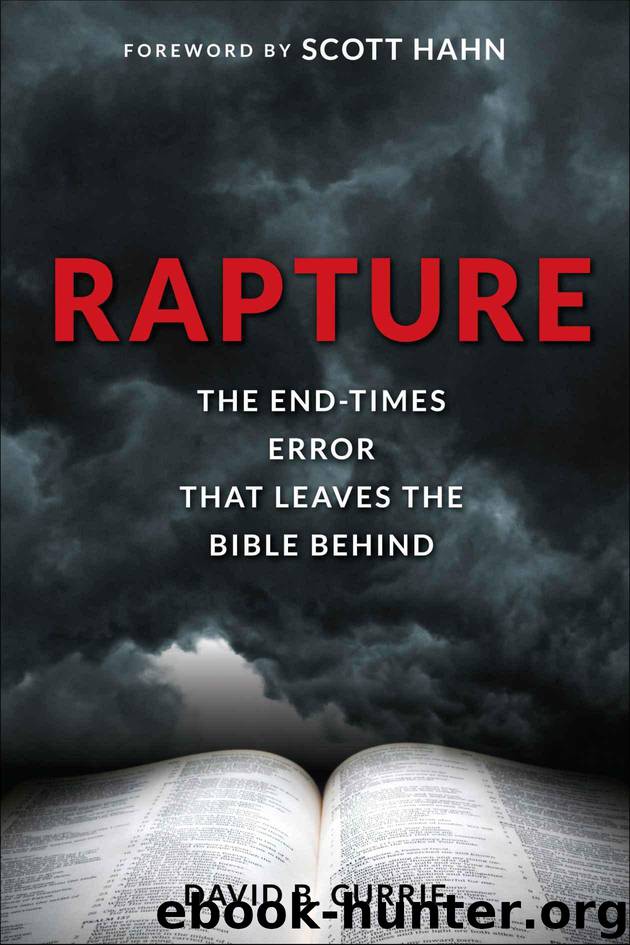Rapture: The End-Times Error That Leaves the Bible Behind by David B. Currie

Author:David B. Currie
Language: eng
Format: mobi, epub
Tags: protestantism, Catholic, protestant, Rapture, Catholicism, apologetics
ISBN: 9781928832720
Publisher: Sophia Institute Press
Published: 2004-03-02T07:00:00+00:00
The mystery of God
What is this mystery of God being fulfilled in The Apocalypse? In all of the Gospels, Jesus refers to a “mystery” (or “secret”) only once. In all three synoptic Gospels this mystery is put into the same context (Matt. 13:11; Mark 4:11; Luke 8:10). It is the mystery of what the Kingdom of the Messiah would really be like. It would not be the physical, political, conquering power for which the Jewish leadership had hoped. No, the Messianic Kingdom would be an interior kingdom—the rule of an omnipotent Christ within the lives and hearts of men and women all over the world. For this reason, it would never be defeated or uprooted, as Daniel had foretold in his visions of the statue and the beasts. Because it was a spiritual rule, no unbeliever would be able to enter it, as Zechariah had stated at the end of his oracles (Appendix Three).
The spiritual aspect of the Kingdom of the Messiah was a theme throughout much of the Old Testament prophets. Jesus even reminds His disciples that “many prophets and righteous men longed to see what you see, and did not see it” (Matt. 13:17). Even at the moment of death, Christ emphasized to an unbelieving Pilate that His was a spiritual Kingdom: “My kingship is not of this world; if my kingship were of this world, my servants would fight, that I might not be handed over to the Jews; but my kingship is not from the world.… For this I have come into the world, to bear witness to the truth” (John 18:36–37).
If you look for Jesus’ teaching on what the Messiah’s Kingdom would be like, you will see the obvious silhouette of the Church. The parable of the sower and the soils teaches that entrance to the Kingdom is open to all, but dependent on a personal response to the “word” (Matt. 13:3–23). The public encounter with His family reveals that, in the Kingdom, what matters is no longer a holy bloodline, but doing “the will of my Father in Heaven” (Matt. 12:50). In the parable of the weeds and the wheat, Jesus explains that His Kingdom will have loyal, obedient subjects mingled with the evil and traitorous. Even though His servants recognize this, they are to leave the final judgment to Christ (Matt. 13:24–30, 36–43). This lesson is so important that it is reiterated in the parable of the fishes (Matt. 13:47–51).
In another parable, the mustard seed is a picture of how the Kingdom will be small and hidden in the beginning, yet contain within itself all things necessary to grow into a huge and fruitful tree (Matt. 13:31–32). This is the fulfillment of Daniel’s stone growing into a mountain. This reflects precisely the development of the Church. The Catechism clearly teaches that “The Church was catholic [i.e., having correct and complete confession of faith, full sacramental life, and ordained ministry in apostolic succession] on the day of Pentecost and will always be so until the day of the Parousia” (CCC, par.
Download
Rapture: The End-Times Error That Leaves the Bible Behind by David B. Currie.epub
This site does not store any files on its server. We only index and link to content provided by other sites. Please contact the content providers to delete copyright contents if any and email us, we'll remove relevant links or contents immediately.
Resisting Happiness by Matthew Kelly(2900)
The Social Psychology of Inequality by Unknown(2332)
Designing Your Life by Bill Burnett(2294)
Day by Elie Wiesel(2258)
The Giving Tree by Shel Silverstein(1852)
Angels of God: The Bible, the Church and the Heavenly Hosts by Mike Aquilina(1638)
Human Design by Chetan Parkyn(1587)
Augustine: Conversions to Confessions by Robin Lane Fox(1479)
The Supreme Gift by Paulo Coelho(1457)
Hostage to the Devil by Malachi Martin(1406)
7 Secrets of Divine Mercy by Vinny Flynn(1400)
Jesus of Nazareth by Joseph Ratzinger(1396)
Dark Mysteries of the Vatican by H. Paul Jeffers(1353)
The Vatican Pimpernel by Brian Fleming(1347)
St. Thomas Aquinas by G. K. Chesterton(1324)
Saints & Angels by Doreen Virtue(1315)
My Daily Catholic Bible, NABRE by Thigpen Edited by Dr. Paul(1213)
Called to Life by Jacques Philippe(1209)
The Ratline by Philippe Sands(1175)
